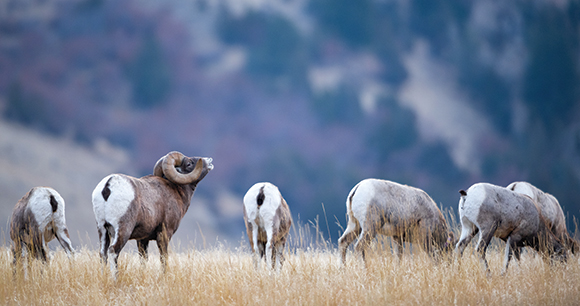The Christine Stevens Wildlife Award—named in honor of AWI’s late founder and president for over 50 years—provides grants of up to $15,000 to help fund innovative strategies for humane, nonlethal wildlife conflict management and study.

This year, over 40 applications were submitted encompassing species ranging from bees to beaked whales and issues such as mitigating light pollution harm to pollinators, using contraceptives to humanely reduce urban rat populations, and assessing the impact of livestock pathogens on bighorn sheep. Of these, the following eight projects were chosen to receive awards:
- Mr. Nate Denke, University of Washington: using bioacoustics to examine the impact of recreational activities on sensitive birds.
- Dr. Lorenzo Fiori, Texas A&M University–Corpus Christi: using drones to assess the nutritional conditions of dolphins who interact with fishing trawlers.
- Rushil Kukreja, Thomas Jefferson High School for Science and Technology: assessing the impact of light pollution on pollinators via high-speed cameras and acoustic devices.
- Dr. Maureen H. Murray, Lincoln Park Zoo: assessing the efficacy of contraceptive food pellets to nonlethally reduce an urban rat population.
- Dr. Nico(la) Ransome, La Orca de Sayulita/Murdoch University: collecting beaked whale DNA via noninvasive tools to assess species presence in the Islas Marias UNESCO Biosphere Reserve in Mexico.
- Dr. Ronnie Serfa Juan, USDA-Agricultural Research Service Center for Grain and Animal Health Research: humanely deterring birds around aquaculture facilities via AI-driven, nonlethal tactics.
- Dr. Logan Thomas, Kansas State University: collecting hair samples from javelina via noninvasive camera-monitored hair snares to assess drivers of javelina-human conflicts.
- Ms. Jasime Veitch, University of Calgary: performing genetic analysis on bighorn sheep fecal samples to examine the microbial transmission of pathogens at the wildlife-livestock interface.